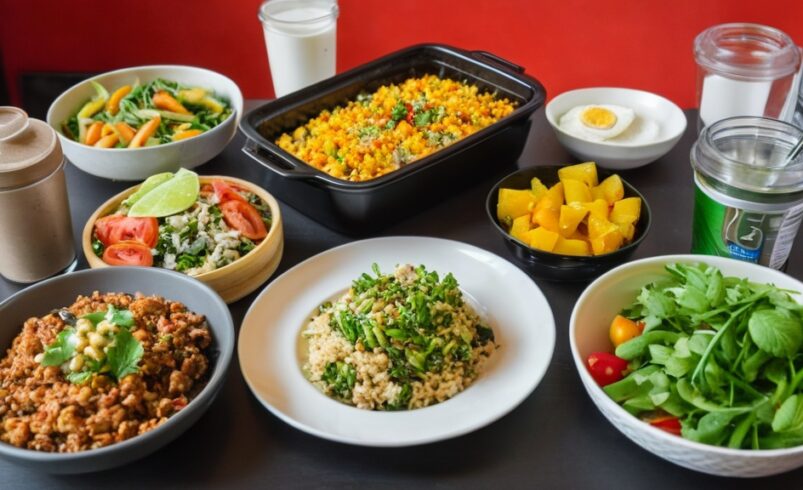How to Plan Meals Around Training Sessions
- November 17, 2025
- 0
Meal planning plays a crucial role in achieving fitness goals. It helps individuals stay organized and focused on their nutrition. By planning meals, you can ensure you consume
Meal planning plays a crucial role in achieving fitness goals. It helps individuals stay organized and focused on their nutrition. By planning meals, you can ensure you consume

Meal planning plays a crucial role in achieving fitness goals. It helps individuals stay organized and focused on their nutrition. By planning meals, you can ensure you consume the right nutrients at the right times.
Effective meal planning also saves time and reduces stress. When you know what to eat, you avoid last-minute unhealthy choices. This proactive approach leads to better dietary habits and improved overall health.
Before diving into meal planning, assess your training schedule. Identify the days and times you work out. This information will guide your nutritional needs and meal timing.
Next, clarify your fitness goals. Are you aiming to build muscle, lose weight, or improve endurance? Your goals will dictate your macronutrient ratios and meal composition.

Pre-workout nutrition is essential for maximizing performance. Consuming the right foods before exercise provides energy and enhances endurance. Aim for a balanced meal that includes carbohydrates, protein, and healthy fats.
Consider eating 30 minutes to two hours before your workout. This timing allows your body to digest and convert food into energy. Foods like bananas, oatmeal, or yogurt can serve as excellent pre-workout options.
Post-workout nutrition is just as important as pre-workout meals. After exercising, your body needs nutrients to recover and rebuild. Focus on consuming protein and carbohydrates within 30 minutes of finishing your workout.
Protein helps repair muscle tissue, while carbohydrates replenish glycogen stores. A smoothie with protein powder and fruit or a chicken sandwich can effectively meet these needs. Prioritize these meals to support your recovery process.
Balancing macronutrients is vital for energy and recovery. Carbohydrates provide quick energy, while proteins support muscle repair. Healthy fats also play a role in hormone production and overall health.
Aim for a balanced intake of these macronutrients throughout the day. Adjust your ratios based on your training intensity and goals. For example, endurance athletes may require more carbohydrates than strength trainers.

Whole foods should form the foundation of your meal plan. These foods are minimally processed and packed with nutrients. Incorporate fruits, vegetables, whole grains, lean proteins, and healthy fats into your diet.
Nutrient-dense ingredients provide essential vitamins and minerals. They also help maintain energy levels throughout the day. Focus on colorful fruits and vegetables to maximize nutrient intake.
Hydration is crucial for optimal training and recovery. Water supports various bodily functions, including temperature regulation and nutrient transport. Dehydration can lead to fatigue, decreased performance, and longer recovery times.
Aim to drink water consistently throughout the day. Consider hydrating before, during, and after workouts as well. Electrolyte-rich drinks can also help replenish lost minerals during intense exercise.
Healthy snacks can provide sustained energy between meals. Choose options that combine protein, healthy fats, and carbohydrates for balanced nutrition. Examples include Greek yogurt with fruit or nut butter on whole-grain toast.
Snacking can help prevent energy crashes and keep hunger at bay. Prepare snacks in advance to ensure you have healthy options readily available. This strategy supports your overall meal plan and keeps you on track.
Meal timing plays a significant role in performance and recovery. Schedule meals around your training sessions for optimal results. Eating too close to a workout may cause discomfort, while waiting too long can hinder performance.
Plan to eat a balanced meal two to three hours before exercising. After your workout, prioritize a nutritious meal within 30 minutes to support recovery. This approach ensures your body receives the nutrients it needs when it needs them most.
Listening to your body’s hunger signals is essential for effective meal planning. Pay attention to when you feel hungry or full throughout the day. This awareness helps you make better food choices and avoid overeating.
Practice mindful eating by slowing down during meals. Focus on the flavors and textures of your food. This practice enhances your connection with hunger cues and promotes healthier eating habits.
A sustainable meal plan adapts to your lifestyle and preferences. Flexibility allows you to enjoy various foods while meeting your nutritional needs. Consider incorporating different recipes or cuisines to keep things interesting.
Regularly reassess your meal plan based on changes in your training or goals. Life events may require adjustments, so stay open to modifying your approach. A flexible plan supports long-term success in achieving your fitness objectives.
In conclusion, effective meal planning is vital for anyone pursuing fitness goals. By understanding the importance of nutrition, timing meals around workouts, and listening to your body, you can create a sustainable plan that supports both energy levels and recovery. Prioritize whole foods, hydration, and balanced macronutrients for optimal performance in training sessions.
With dedication and flexibility, you can achieve lasting success in your fitness journey.